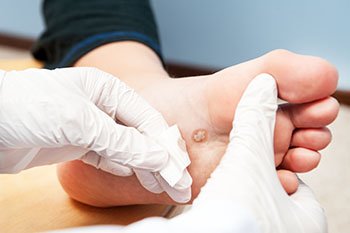
Plantar warts, caused by the human papillomavirus, HPV, can develop in anyone, but certain factors may heighten vulnerability. Individuals with weakened immune systems are at an increased risk, as the body's defense mechanisms struggle to combat the viral invader. The symptoms of plantar warts often include small, fleshy growths on the soles of the feet, accompanied by tenderness or pain while walking. Children and teenagers, with developing immune systems, are particularly susceptible to these uncomfortable growths. Prolonged exposure to moist environments, such as communal showers or swimming pools, also escalates the risk. Additionally, those who frequently walk barefoot in public spaces may find themselves more prone to contracting the virus. If you have developed a plantar wart, it is strongly suggested that you visit a podiatrist who can offer effective treatment options and prevention tips.
Plantar warts can be very uncomfortable. If you need your feet checked, contact Gerald Erskine, DPM from Seneca Family Footcare. Our doctor will assist you with all of your foot and ankle needs.
About Plantar Warts
Plantar warts are the result of HPV, or human papillomavirus, getting into open wounds on the feet. They are mostly found on the heels or balls of the feet.
While plantar warts are generally harmless, those experiencing excessive pain or those suffering from diabetes or a compromised immune system require immediate medical care. Plantar warts are easily diagnosed, usually through scraping off a bit of rough skin or by getting a biopsy.
Symptoms
- Lesions on the bottom of your feet, usually rough and grainy
- Hard or thick callused spots
- Wart seeds, which are small clotted blood vessels that look like little black spots
- Pain, discomfort, or tenderness of your feet when walking or standing
Treatment
- Freezing
- Electric tool removal
- Laser Treatment
- Topical Creams (prescription only)
- Over-the-counter medications
To help prevent developing plantar warts, avoid walking barefoot over abrasive surfaces that can cause cuts or wounds for HPV to get into. Avoiding direct contact with other warts, as well as not picking or rubbing existing warts, can help prevent the further spread of plantar warts. However, if you think you have developed plantar warts, speak to your podiatrist. He or she can diagnose the warts on your feet and recommend the appropriate treatment options.
If you have any questions please feel free to contact our office located in Ronceverte, WV . We offer the newest diagnostic and treatment technologies for all your foot and ankle needs.
